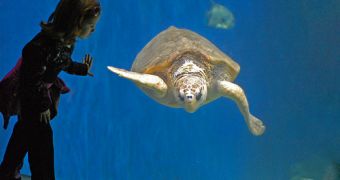For several years now, there has been a decline in the Atlantic sea turtle populations and besides the obvious human cause, an international team of mycologists and ecologists who were studying Atlantic sea turtles at Cape Verde have found that the species is also threatened by a fungal infection that attacks eggs.
The research was led by Dr Javier Diéguez-Uribeondo and Dr Adolfo Marco from Consejo Superior de Investigaciones Cientificas – CSIC, Spain.
The team focused on the loggerhead sea turtle (Caretta caretta) population, that can be found on Boavista Island, Cape Verde, off the West African coast.
This is actually one of the most important nesting regions for this species, where because of hatching failures, the population numbers are declining.
Scientists took egg samples and found several stages of the infection, and when they analyzed sea turtle nests in Ervatao, Joao Barrosa and Curral Velho beaches, they also found ill embryos.
Overall, they discovered 25 isolates of Fusarium solani associated with egg mass mortality.
F. solani is a very complex strain of fungus that contains over 45 phylogenetic and biological species.
The fungus spreads through the soil and causes serious diseases in plants – it is known to have infected at least 111 plant species, extending over 87 genera, and in animals with immunodeficiency.
The eggs spend long periods of time covered in sand, in a very humid environment and warm temperatures, and these are the best conditions for the development of fungi.
Still, this is the first time that a relationship between this fungal species and hatching failure has been investigated.
The situation is pretty bad and it is a major risk to the conservation of loggerhead turtles in the area, but now that more is known about the infection caused by these fungal strains, conservation programs based on artificial incubation can be developed.
“In the past 30 years we have witnessed an abrupt decline in the number of nesting beaches of sea turtles worldwide,” said the leaders of the research.
“While many of the reasons for this are related to the human impact of the coastal environment it has been suspected that the decline is also due to pathogenic microorganisms.”
The research was published in FEMS Microbiology Letters, AlphaGalileo reports.

 14 DAY TRIAL //
14 DAY TRIAL //